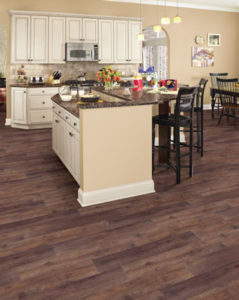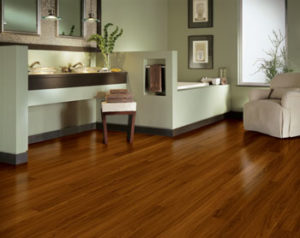 Luxury vinyl tile (LVT) is the hot commodity in the resilient category, capturing nearly 8% of the total market in 2009 (FCNews, June 28). Part of what’s driving demand for LVT is the locking technology it employs, making it one of the easiest installs in the flooring industry.
Luxury vinyl tile (LVT) is the hot commodity in the resilient category, capturing nearly 8% of the total market in 2009 (FCNews, June 28). Part of what’s driving demand for LVT is the locking technology it employs, making it one of the easiest installs in the flooring industry.
While 8% may seem like an insignificant number, one would do well to remember that LVT is a relatively new resilient product, especially when positioned next to products like linoleum with more than 150 years in production. In comparison, LVT was brought into this country 40 years ago when Metroflor saw a demand for the product, said Michael Raskin, president. “My father saw LVT as an opportunity and was the first to have it made in Taiwan. Before that in the 1970s it was mainly self-stick, DIY-type tile. With Metroflor, my dad got them to improve the quality as well as bring luxury designs to appeal to the U.S. market at a value price point.”
That product evolved into Konecto, the market’s first truly floating LVT introduced four years ago. “Flooring was going toward glueless, so we helped create a mechanism to make the floating floor,” Raskin said. “That was the game changer. The market was craving a product like that because of the issues with laminates, such as acoustics, moisture and flexibility. This was the product retailers [and consumers] were looking for.”
Konecto construction is basically two pieces of vinyl fused together with a grip strip to provide flexibility, backed by a fiberglass sheet to make the product lay flat. If the flooring is too rigid it may come apart or have stability issues, Raskin advised.
He describes Metroflor’s Konecto as the honey that attracted the bees. “We have a patented product that’s been in the market longer than anyone else, so it has been through the learning curve,” adding the locking system is very hard to produce with a slower production rate.
Konecto opened the floodgates for floating LVT products from just about every resilient supplier, and then some. For example, Armstrong is also producing a floating floor with an attached pressure-sensitive adhesive, which the mill coins as Lynx technology. “Because each plank attaches to the planks beside and above it— not the floor beneath— it installs quickly and easily over practically any surface in the home or business,” said Yon Hinkle, product manager, resilient tile. To install, plank placement and a peel-and-stick process is employed. Mistakes can be rectified by pulling up the flexible plank and repositioning the piece without affecting the rest of the floor.
Congoleum employs a similar technology with its recently introduced Connections product. Connections, which also employs an adhesion strip, was  launched this spring and has been gaining popularity in the market.
launched this spring and has been gaining popularity in the market.
“Connections has taken off and is selling over and above our most optimistic original projections,” said Dennis Jarosz, senior vice president of sales and marketing. “In fact, we have had to stage the rollout of the product on a regional basis in order to not disappoint our customer base. Retailers and contractors everywhere have told us they will support Connections with its unique aerospace adhesive film and locking technology. We look for this product to be a huge part of our sales growth in the fourth quarter of 2010 and really contribute to 2011.”
While the floating floor system has been progressing in LVT, laminate-inspired locking systems have been moving forward as well. USFloors, a company known for its cork and bamboo flooring, entered the game last year with a cork-infused product called Vinacork. The product incorporates cork layers to soften subfloor problems with Valinge’s 2G locking system.
“The glueless locking plank format is an innovation that has retailers taking notice,” said Gary Keeble, marketing manager. “Vinacork requires no glue, which eliminates VOCs from the installation and can be walked on immediately.”
Like Pavlov’s dog, the brains behind Mannington’s LVT offering responded to the clicks in its laminate category by transferring that technology to Adura.  Improving on its Loc-N-Go technology, LockSolid is a completely adhesive-free installation. Its patented mechanical locking system, similar to a laminate flooring concept, is meant to solve any of the drawbacks associated with the adhesion of adjoining planks, said David Sheehan, vice president of resilient and laminate.
Improving on its Loc-N-Go technology, LockSolid is a completely adhesive-free installation. Its patented mechanical locking system, similar to a laminate flooring concept, is meant to solve any of the drawbacks associated with the adhesion of adjoining planks, said David Sheehan, vice president of resilient and laminate.
“We were not satisfied with having to make stipulations on the type of environments in which you could and could not install floating LVT,” he said. “We wanted a situation where you could install floating LVT in the same environments as traditional gluedown LVT.”
The major improvement with this product is joint strength. Based on two separate tests, shear strength and pull-apart, Mannington is so confident in LockSolid’s fortitude it is offering the industry’s first no-gap 20-year warranty. “In all those tests, we outperform all competing products as well as those we know are about to enter the market,” Sheehan boasted.
Metroflor has also looked to the laminate category as it continues to add floating floor products in various constructions to its portfolio. The recently introduced Hybrid is said to combine the best of both the laminate and LVT worlds as the line fuses ease of installation and subfloor preparation all in the product.
“Hybrid is more an LVT than a laminate because of how it performs,” Raskin stated. As a company its strength lies in LVT and its goal is to come up with different types of LVT products with all the mechanisms that make sense and the market responds to favorably.
“With Hybrid it’s a different market,” he explained. “When it was first out, people asked why bother with this line when you have Konecto? It was a valid question. What it offers the consumer is choice: There is greater perceived value with the thicker product and wearlayer than comes with Konecto.”
With patented locking technology in more than 20 countries, Metroflor’s innovation is tried and true, constantly growing the category.
“The same way that you buy a computer or a car, it is only natural to make improvements,” Raskin concluded.
-Emily Hooper
